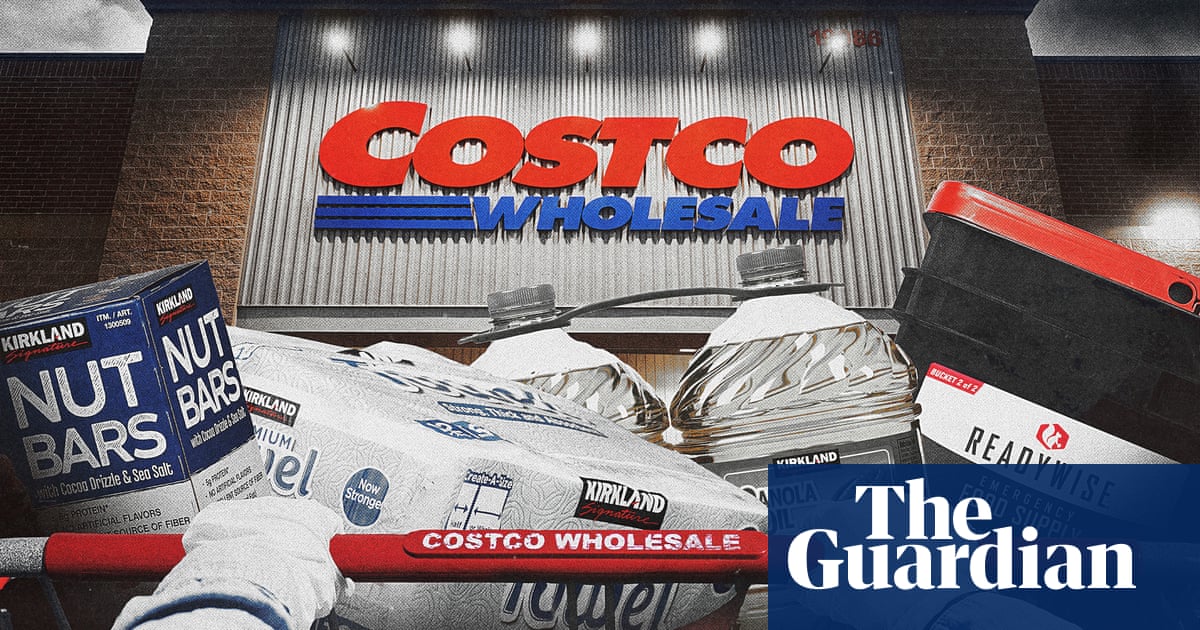Last summer,Costcoshoppers noticed something new on the big-box store’s shelves. For the low, low price of $62.99, preparedness-minded customers could snatch up what one food influencercalleda “Costco apocalypse dinner kit”.
Think of the kit as a KFC-style bucket, but instead of fried chicken, it is stuffed with an emergency supply of 132 meals – including pouches of dehydrated macaroni and cheese, apple cinnamon cereal and chicken pot pie – promised to last up to 25 years in storage, or until the big one hits.
There were lackluster reviews – “I’d sooner allow myself to be eaten by zombies than have to survive on this,”wroteEmily Heil, a Washington Post food reporter. Spectators on social media noted that the bucket, which contained meals even the worst home chef could whip up, might be great for a college dorm room. Some people said they ate the dinners while camping.
A representative for Costco declined to say how many apocalypse buckets it has sold in the past year. Representatives for ReadyWise, the company that makes the bucket in various sizes as well as other “survival foods”, did not respond to a request for comment.
It doesn’t take much imagination to see why Costco might be a paradise forpreppers, or people who stockpile supplies and learn survival skills in advance of emergencies such as natural disasters or societal collapse. The chain sells everything from dry goods to tools to baby formula, necessities both for someone who likes to keep a well-stocked house in the best of times and anyone scared enough to anticipate the end of times.
“Preppers like efficiency, and Costco is nothing if not efficient,” said Coby Coonradt, a 44-year-old from Vernal, Utah, who co-hosts the Casual Preppers Podcast with his friend Cameron Hardy. “You can stock up on your 72-hour kit and your next family BBQ in the same trip.” Beyond food and water, Coonradt turns to Costco for freeze-dried meals, first aid kits, fire extinguishers and off-grid lighting. “You can build out a pretty legit emergency kit just by shopping there once a month.”
Costco’s lore runs deep; self-described “Costcodians”, or super fans, revere the members-only chain, which is based in the US and is thethird-largest retailerin the world, after Amazon and Walmart. The store’s harsh fluorescent lighting and industrial shelving may not count for much aesthetically, but with an abundance of cheaper choices, who cares? More than 130 million peoplecallCostco their grocery store worldwide, and while not all of them identify as preppers, the chain’s tendency toward bulk – its house brand Kirkland sells everything from hot dogs to golf balls to vodka in impressively large containers – lends itself well to the ideology.
“Prepping doesn’t have to be extreme,” Coonradt said. “You can be totally normal, live in the suburbs, shop at Costco, and still be ready for a flood or power outage.” His co-host, Hardy, who is 43, described how apocalypse-minded shoppers can build up a doomsday supply in the same way that Ernest Hemingway describes how a character went broke in The Sun Also Rises: “gradually, and then suddenly”.
“Since most people shop for groceries weekly, a simple way to start preparing is to buy a little extra food and water each time,” Hardy said. “This builds up an emergency supply large enough to keep you and your family safe during most crises.” If not the rapture, then a minor snowstorm, a sustained power outage,economic turmoil, a climate catastrophe or another pandemic.
Christine, a 43-year-old from Idaho who posts prepper content to her 655,000 followers on her YouTube account, Frugal Fit Mom, owns one of the Costco buckets, which she uses mostly for camping meals. She thinks preppers get more out of buying staples in bulk. “It’s important to only get things you already use [when building an emergency kit],” she said. “If you get canned tuna because you saw someone else get it, but you hate canned tuna, sure, it will keep you alive, but you’re not going to be happy with life.”
Both Christine’s Costco reliance and prepper mentality comes from “growing up really, really poor”, she said. Her parents bought in bulk because it was cheaper. But their thriftiness allowed for creativity: they made bread from scratch and built backyard gardens for their kids to play in. Now Christine passes these lessons on to her children. “You’re not gonna find it cheaper anywhere other than Costco,” she said.
As a brand, Costco subtly leans into its reputation as a prepper paradise. It sells a variety of non-perishable foods, packs of “self-heating emergency meals” (just add a “non-flammable liquid”) and portable water purification kits. It also does aroaring tradein gold bars and coins, according to Money.com.
But if prepperism isassociated with the right, the company’s politics don’t necessarily align. Costco madeheadlinesearlier this year by upholding its diversity, equity and inclusion initiatives amid the Trump administration’s crackdown, and Costco’s director, Hamilton E James,has donatedto Democratic Pacs and parties.
For some, the Costco prepper bucket symbolizes how distressingly within reach the end of the world seems. For others, it’s just another item to throw in the bunker. Either way,more than halfof US families stockpile food, according to the market research firm Packaged Facts, signaling some level of concern with the state of things.
In Oklahoma, a homesteading influencer named Barbara – she goes by A Homestead Journey on YouTube – used Costco when stocking her “prepper pantry”. It contains all her family’s favorite food items, just en masse, so they don’t have to run out to the store when disaster strikes.
“Costco is like a Disneyland for preppers,” said Barbara, who is 39 and also did not share her last name due to privacy concerns. “Every time I walk into Costco, I’m not just shopping – I’m investing in my family’s security.”
